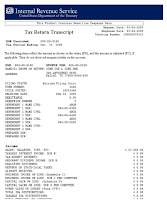 On May 1, 2018 we posted 1st Taxpayer Victory in a "Willful" FBAR Penalty Case Appealed! where we discussed that on March 7, 2018 we posted 1st Taxpayer Victory in a "Willful" FBAR Penalty Case! where we discussed that on September 20, 2017, the Eastern District of Pennsylvania issued an important taxpayer friendly opinion regarding the "willfulness" standard in FBAR penalty matters and In Bedrosian v. United States, Case No. 2:15-cv-05853-MMB (E.D. Pa., Sept. 20, 2017), the court held that the government had not met its burden in proving that Bedrosian had willfully violated FBAR reporting requirements. We also discussed that this opinion could have a major effect on future IRS decisions in the offshore compliance arena and may cause some taxpayers, to seek a more aggressive approach in addressing prior non-compliance.
On May 1, 2018 we posted 1st Taxpayer Victory in a "Willful" FBAR Penalty Case Appealed! where we discussed that on March 7, 2018 we posted 1st Taxpayer Victory in a "Willful" FBAR Penalty Case! where we discussed that on September 20, 2017, the Eastern District of Pennsylvania issued an important taxpayer friendly opinion regarding the "willfulness" standard in FBAR penalty matters and In Bedrosian v. United States, Case No. 2:15-cv-05853-MMB (E.D. Pa., Sept. 20, 2017), the court held that the government had not met its burden in proving that Bedrosian had willfully violated FBAR reporting requirements. We also discussed that this opinion could have a major effect on future IRS decisions in the offshore compliance arena and may cause some taxpayers, to seek a more aggressive approach in addressing prior non-compliance.
The Court of Appeals for the Third Circuit now has ruled on:
- Whether a district court has jurisdiction over a Foreign Bank and Foreign Accounts (FBAR) matter where the taxpayer only pays a part of the assessed FBAR penalty; and
- What an Appeals Court's standard of review should be with respect to a lower court's determination that there was willful violation of FBAR requirements.
- The Court also remanded the case because it was not satisfied with the determination by the trial court that there was no willful violation.
Bedrosian Challenged FBAR Based Upon Illegal Exaction.
An illegal exaction claim involves money that was “improperly paid, exacted, or taken from the claimant in contravention of the Constitution, a statute, or a regulation.” (Norman v. U. S., (Fed. Cir. 2005) 429 F.3d 1081) Where a taxpayer is able to establish that he paid taxes that were improperly collected by the government, he succeeds on such a claim.
Arthur Bedrosian is a U.S. citizen who has had a successful career in the pharmaceutical industry over the past several decades, including as Chief Executive Officer at Lannett Company, Inc., a manufacturer and distributor of generic medications. In the early '70s, he opened a savings account with a bank in Switzerland; at some point, at least as early as 2005, a second account was added.
Throughout the decades that Bedrosian maintained the Swiss accounts, he did not prepare his own tax returns and instead had his accountant do so. Bedrosian did not inform the accountant of the bank accounts until the 1990s, because, he stated, the accountant never asked about them. When informed, Bedrosian indicated that the accountant told him that he had been breaking the law for the past 20 years by not reporting the accounts. He also said that the damage was already done, that Bedrosian should do nothing, and that the issue would be resolved on Bedrosian's death when the assets in the Swiss accounts would be repatriated as part of his estate and taxes would be paid on them then. Based on this advice, as well as his fear that he would be penalized for his years of noncompliance, Bedrosian did not report either Swiss account on his tax returns until 2007, when the accountant died and he hired a new accountant.
Bedrosian filed a federal income tax return for 2007 that reflected, for the first time, that he had assets in a foreign financial account in Switzerland. He also filed a FBAR for the first time in 2007. But, he only reported the existence of one of his Swiss accounts (which had assets totaling approximately $240,000) and did not report the other account (which had assets totaling approximately $2.3 million). Bedrosian did not report any of the income that he earned on either Swiss account on his 2007 return.
Sometime after 2008, the Swiss bank told Bedrosian that it would be providing his account information to the U.S. government. Around this time, prior to the government's initiation of its investigation, Bedrosian hired an attorney to look into his reporting obligations for the Swiss accounts. In August 2010, he filed an amended 2007 federal return on which he reported the approximately $220,000 of income he had earned from the Swiss accounts; he also filed an amended FBAR for 2007, on which he reported both bank accounts. Although Bedrosian took this corrective action before the government began its audit, he did not do so until after IRS had discovered the existence of the two accounts.
IRS initiated its investigation of Bedrosian in April 2011, with a focus on tax year 2008. Beginning then, Bedrosian engaged with IRS cooperatively, providing them with all documentation requested. The investigation culminated in a case panel of IRS agents recommending that Bedrosian be penalized for nonwillful violations of the FBAR reporting requirement and that the case against him be closed. For reasons unclear in the record, the case wasn't closed but instead was re-assigned to another IRS agent, who conducted her own review and concluded that Bedrosian's violation had been willful.
On July 18, 2013, IRS sent Bedrosian a letter stating that it was imposing a penalty for his willful failure to file the FBAR form for tax year 2007. The proposed penalty was $975,789, 50% of the maximum value of the account ($1,951,578), the largest penalty possible under the regs.
Bedrosian filed suit in the district court alleging illegal exaction, i.e., that an unwarranted penalty was imposed on him; IRS counterclaimed for full payment of the penalty, as well as accrued interest on the penalty, a late payment penalty, and other statutory additions to the penalty. Both parties sought summary judgment.
District court's conclusion. The district court concluded that IRS had not met its burden of establishing that Bedrosian willfully violated the FBAR reporting requirement.
Noting that every federal court to have considered the issue had found the correct standard to be the one used in other civil contexts, that is, a taxpayer has willfully violated FBAR when he either knowingly or recklessly fails to file an FBAR, the district court determined that the requisite willful intent for a FBAR violation is satisfied by a finding that the taxpayer knowingly or recklessly violated the statute.
Circuit Court -- Whether the district court had jurisdiction. The Circuit Court first considered whether the district court had jurisdiction over Bedrosian's claim. The Court did not actually rule on this issue. It said that even if Bedrosian's initial claim was not within the Court's original jurisdiction for Bedrosian's complaint, it had the authority to act by virtue of IRS's counterclaim, which supplied jurisdiction under 28 USC 1345.
This violates a first principle of tax litigation in district court, pay first and litigate later. "We are inclined to believe the initial claim of Bedrosian was within the scope of 28 USC 1346(a)(1) and thus did not supply the district court with jurisdiction at all because he did not pay the full penalty before filing suit, as would be required to establish jurisdiction under subsection (a)(1)."
Circuit Court -- Standard of review by appellate courts regarding willfulness under FBAR. The Court then ruled on what it contended was an issue that never been brought to the court before, i.e., the standard of review that applies to a district court's willfulness determination under the FBAR statute.
The Court said that, in the context of other civil penalties, it had held that a district court's determination of willfulness is a primarily factual determination that is reviewed for clear error. Similarly, it said, it had held that the Tax Court's determination of willfulness in tax matters is reviewed for clear error.
The Court then concluded that it should follow suit and hold that a district court's determination in a bench trial as to willfulness under the FBAR statute is reviewed for clear error.
The Court then agreed with the district court's definition of what constituted willfulness in the FBAR context but remanded the case because it was not convinced that the district court used the correct legal standard in its determination that there was no willfulness.
The Court agreed with the district court's holding that the proper standard for willfulness is "the one used in other civil contexts, that is, a defendant has willfully violated [31 USC 5314] when he either knowingly or recklessly fails to file [an] FBAR." It said that a person commits a reckless violation of the FBAR statute by engaging in conduct that violates an objective standard: action entailing an unjustifiably high risk of harm that is either known or so obvious that it should be known. And, it said that this holding is in line with other courts that have addressed civil FBAR penalties, see, e.g., Williams, (CA 4 2012) 110 AFTR 2d 2012-5298, as well as prior Third Circuit cases addressing civil penalties assessed by IRS under the tax laws. See, e.g., Carrigan, (CA 3 1994) 74 AFTR 2d 94-5425.
The Court also said that the remainder of the district court's opinion did not dispel its concern.
Although that opinion discussed whether Bedrosian acted knowingly, it did not consider whether, when his 2007 FBAR filing came due, he (1) clearly ought to have known that (2) there was a grave risk that an accurate FBAR was not being filed, and if (3) he was in a position to find out for certain very easily.
Noting that it could not "defer to a determination we are not sure the district court made based on our view of the correct legal standard," it thus remanded to the district court to render a new judgment on the issue of willfulness.
Read more at: Tax Times blog

















